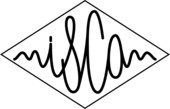



Program
SSW8 Accepted Papers
- Oral presentations: 20min + 5min for questions
- Poster presentations: 100min; landscape format (max. height: 95 cm ; max. width: 194cm)
Saturday, August 31st
Oral Session O1
Automatic detection of inhalation breath pauses for improved pause modelling in HMM-TTSRole of Pausing in Text-to-Speech Synthesis for Simultaneous InterpretationMinimum Error Rate Training for Phrasing in Speech SynthesisHMM-based Speech Synthesis of Live Sports Commentaries: Integration of a Two-Layer Prosody AnnotationPoster Session P1
Parametric model for vocal effort interpolation with Harmonics Plus Noise ModelsVietnamese HMM-based Speech Synthesis with prosody informationContext labels based on "bunsetsu" for HMM-based speech synthesis of JapaneseUsing Adaptation to Improve Speech Transcription Alignment in Noisy and Reverberant EnvironmentsSpeech synthesis using a maximally decimated pseudo QMF bank for embedded devicesHMM-based sCost quality control for unit selection speech synthesisUnderstanding Factors in Emotion PerceptionMultilingual Number Transcription for Text-to-Speech ConversionNoise-Robust Voice Conversion Based on Spectral Mapping on Sparse SpaceCross-variety speaker transformation in HSMM-based speech synthesisOral Session O2
Residual Compensation based on Articulatory Feature-based Phone Clustering for Hybrid Mandarin Speech SynthesisInvestigation of intra-speaker spectral parameter variation and its prediction towards improvement of spectral conversion metricText to Speech in New Languages without a Standardized OrthographyUnsupervised and lightly-supervised learning for rapid construction of TTS systems in multiple languages from ‘found’ data: evaluation and analysis
Sunday, September 1st
Oral Session O3
A phonetic-contrast motivated adaptation to control the degree-of-articulation on Italian HMM-based synthetic voicesUsing neighbourhood density and selective SNR boosting to increase the intelligibility of synthetic speech in noiseNoise Robustness in HMM-TTS Speaker AdaptationOral Session O4
New Method for Rapid Vocal Tract Length Adaptation in HMM-based Speech SynthesisText-to-speech synthesizer based on combination of composite wavelet and hidden Markov modelsAn experimental comparison of multiple vocoder typesStatistical Model Training Technique for Speech Synthesis Based on Speaker ClassPoster Session P2
Is Intelligibility Still the Main Problem? A Review of Perceptual Quality Dimensions of Synthetic SpeechEvaluation of contextual descriptors for HMM-based speech synthesis in FrenchTowards Speaking Style Transplantation in Speech SynthesisInvestigating the shortcomings of HMM synthesisProsodic analysis of storytelling discourse modes and narrative situations oriented to Text-to-Speech synthesisObjective evaluation measures for speaker-adaptive HMM-TTS systemsExperiments with Signal-Driven Symbolic Prosody for Statistical Parametric Speech SynthesisSignificance of word-terminal syllables for prediction of phrase breaks in Text-to-Speech systems for Indian languagesThe Effect of Age and Native Speaker Status on Synthetic Speech IntelligibilityExemplar-based Voice Conversion using Non-negative Spectrogram Deconvolution
Monday, September 2nd
Oral Session O5
Mage - Reactive articulatory feature control of HMM-based parametric speech synthesisSystematic database creation for expressive singing voice synthesis controlOral Session O6
Expressive Speech Synthesis: Synthesising AmbiguityInteractional Adequacy as a Factor in the Perception of Synthesized SpeechA novel irregular voice model for HMM-based speech synthesisExpression of Speaker's Intentions through Sentence-Final Particle/Intonation Combinations in Japanese Conversational Speech SynthesisDemo Session
Poster Session P3
SASSC: A Standard Arabic Single Speaker CorpusProsodically Modifying Speech for Unit Selection Speech Synthesis DatabasesCombining a Vector Space Representation of Linguistic Context with a Deep Neural Network for Text-To-Speech SynthesisIs Unit Selection Aware of Audible Artifacts?Development of Electrolarynx with Hands-Free Prosody ControlA Hybrid TTS between Unit Selection and HMM-based TTS under limited data conditionsWavelets for intonation modeling in HMM speech synthesisMulti-variety adaptive acoustic modeling in HSMM-based speech synthesisA Common Attribute based Unified HTS framework for Speech Synthesis in Indian LanguagesCross-lingual speaker adaptation based on factor analysis using bilingual speech data for HMM-based speech synthesis
Latest news
JAM Music Session: Participate!
August 24th 2013
Invited speakers:
Three invited speakers have been included in the technical program:
- Saturday: Deep Learning in Speech Synthesis, Heiga Zen
- Sunday: Prosodic Patterns in Dialog, Nigel Wards
- Monday: Singing voice synthesis, Xavier Serra
August 23th 2013
Updated web
The web has been updated with the detailed program, and Practical information.August 23th 2013
Accepted Papers
The list of accepted papers has been published.July 1st 2013
Registration
The registration system is open. Early registration ends on July 10th.June 28th 2013


